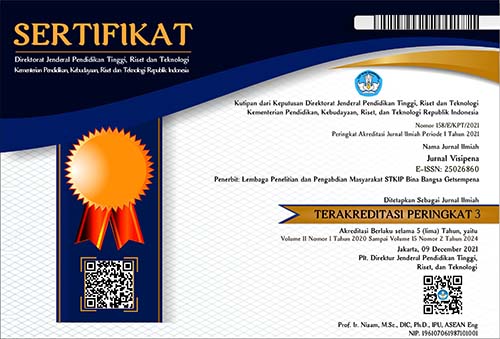HUBUNGAN ANTARA MOTIVASI DAN AKTIVITAS BELAJAR SISWA TERHADAP HASIL BELAJAR KOGNITIF SISWA DENGAN PENERAPAN MODEL PEMBELAJARAN KOOPERATIF TIPE STUDENT TEAMS ACHIEVEMENT DIVISION PADA KONSEP EKOSISTEM
Abstract
One of the very important process in education is a learning process. The success of the learning process is necessary to motivate the student to be able to encourage their learning activities. STAD cooperative learning is a learning model that trains students to work together in a small group and help each other in solving problems, thus the gain mastery of subject matter understanding. STAD cooperative learning model is not much different from the usual lesson by the teacher. Teachers still contribute in the learning process so that not just released and expected students still easy to adaptable. The purpose of this study was to find out the relationship between motivation and student learning activities with the implementation of STAD. This study used quasi-experimental research method. The population of this study was all first grade students in Model Islamic State Junior High School (MTsN) of Banda Aceh amounting to 39 students chosen from 11 classrooms. Samples were collected by using random sampling technique. Instruments of this study were cognitive learning outcomes test, student motivation questionnaire, and student learning activity observation sheet. Data were analyzed by multiple correlation test at significant level of 0.05. The results of the analysis of research data shows the value of R = 0.56 with P 0.00 (< 0.05) then Ho is rejected and Ha accepted. It can be concluded that there was a significant relationship on student motivation and learning activity toward student cognitive learning outcomes by the implementation of STAD. In order to improve the cognitive learning outcomes,motivation and learning activities optimally it is expected that biology teachers implemented STAD than can actively involve the students in learning process.
Downloads
References
Aunurrahman. (2012). Belajar dan Pembelajaran. Bandung: Alfabeta
Azhari, S. (2009). Pengaruh Pembelajaran Kooperatif tipe STAD Disertai dengan Membuat Ringkasan Berformat Mini-Magz dan Minat Belajar Siswa Terhadap Prestasi Belajar Biologi pada Materi Pelajaran Ekosistem. Tesis. UIN Sunan Kalijaga Yogyakarta.
Gonzales, P. (2009). Highlights From TIMSS 2007: Mathematics and Science Achievement of U.S. Fourthand Eighth-Grade Students in an International Context. Washington: National Center for Education Statistics.http://nces.ed.gov/pubs2009/2009001.pdf. Diakses pada tanggal 5 Juni 2012.
Mullis, I.V.S., M.O. Martin., T.A. Garden., R.A., Gregory., K.D. Gonzalez., E.J. Chrostowski, and Connor. (1999). International Report: Finding from IEA’s Repeat of the Third International Mathematics and Science Study at the Eight Grade (TIMSS). Boston: ISC. Diakses pada tanggal 2 mei 2012.
Mullis, I.V.S., M.O. Martin., T.A. Garden., R.A., Gregory., K.D. Gonzalez., E.J. Chrostowski, and Connor. (2003). International Report: Finding from IEA’s Repeat of the Third). Boston: ISC. Diakses pada tanggal 2 mei 2012.
Musfiqon. (2012). Pengembangan Media & Sumber Pembelajaran. Jakarta: Prestasi Pustakaraya.
Nasution. S. (2004). Didaktik Asas-Asas Mengajar. Jakarta: Bumi Aksara.
OECD. (2003). Learning for Tomorrows World-First Results from PISA 2000. http://www.pisa.oecd.org/dataoecd /1/60/34002216.pdf. Diakses pada tanggal 2 juni 2012.
. (2004). Learning for Tomorrows World-First Results from PISA 2003. http://www.pisa.oecd.org/dataoecd /1/60/34002216.pdf. Diakses pada tanggal 3 Juni 2012.
. (2007). Executive Summary PISA 2006: Science Competencies for Tomorrow’sbWorld.http://www.o
ecd.org/pisa/pisaproducts/pisa2006/39725224.pdf. Diakses pada tanggal 1 Juni 2012.
Prasetya, J. T. dan Ahmadi. A. (2005). Strategi Belajar Mengajar. Bandung: Pustaka Setia
Rusyda. S. (2009). Pengaruh Motivasi dan Aktivitas Siswa terhadap Hasil Belajar Siswa Kelas VII SMP Negeri 38 Semarang pada Materi Segi Empat dengan Model Pembelajaran Kooperatif Tipe TGT (Team Games Tournament). Tesis. PPs Universitas Negeri Semarang.
Sardiman, A. M. (2008). Interaksi dan Motivasi Mengajar. Jakarta: Raja Grafindo Persada.
Shaleh, A. R. 2004. Madrasah dan Pendidikan Anak Bangsa. Jakarta: Raja Grafindo Persada.
Sinulinga., dan Nadeak. J. (2012). Pengaruh Model Pembelajaran Kooperatif Tipe STAD Berbasis Mind Mapping terhadap Hasil Belajar Siswa pada Konsep Bunyi di Kelas VIII SMP Negeri 3 Tebing Tinggi. Jurnal Online Pendidikan Fisika, 1 (1): 37-48.
Slavin, R, E. (1995). Cooperative Learning, Theory, Research, and Practice. Needham Heights, Massachusetts: Allyn and Bacon.
Sugianto. (2012). Upaya Peningkatan Hasil Belajar Siswa pada Materi Ekosistem dengan Lingkungan Sebagai Sumber Belajar Melalui Model Pembelajaran Kooperatif Tipe Student Team Achievement Division (STAD) DI SMP Negeri 7 Tanjung Selor.Kalimantan Timur. Pensa E-jurnal, 2 (1): 101-114.
Uno, H. B. (2008). Teori Motivasi dan Pengukurannya. Jakarta: Bumi Aksara.
Van, W. M. (2012). The Effects of the STAD-Cooperative Learning Method on Student Achievement, Attitude and Motivation in Economics Education. Journal of Social Science, 33(2): 261-270.
Zakaria. E., Lu C. C., and Yusoff. D. (2010). The Effects of Cooperative Learning on Students Mathematics Achievement and Attitude towards Mathematics. Journal of Social Sciences, 6 (2): 272-275.
Zulfiani. (2012). Perbedaan Hasil belajar kognitif Siswa Antara Pembelajaran Kooperatif Tipe
STAD dengan Metode Ekspositori pada Konsep Ekosistem Terintegrasi Nilai: Penelitian Quasi Eksperimen di SMA At Taqwa Tangerang. Skripsi: Tanggerang.




















